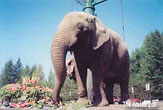Alaska's Lone Elephant Getting Treadmill

ANCHORAGE, Alaska (AP) -- Animal handlers agonized over the issue for more than a year: the wisdom of moving Alaska's only elephant away from the only home she has ever known. Nine elephant experts were consulted from zoos and animal parks in the United States and Canada, and a decision was made: Maggie stays.
The 22-year-old African elephant will continue to reside at the Alaska Zoo -- instead of going to a warmer climate -- with the understanding that her accommodations will be improved and she'll have to maintain a busy schedule, including aerobic workouts on an elephant treadmill. In other words, keepers say, Maggie's life will be all the richer for it.
"We felt we owed Alaska the right to continue to make Alaska the home for Maggie. She has an adoring crowd. The whole community is her herd," said Anita Pritchard, a member of the zoo board that voted overwhelmingly in favor of keeping Maggie.
Maggie arrived at the zoo in 1983 as an infant when her herd in Kruger National Park in South Africa was culled. She joined Annabelle, a more easygoing Asian elephant born in India in 1964.
The Alaska Zoo's relationship with elephants precedes its opening in 1968. Annabelle was the reason the zoo was built, said director Tex Edwards. A wholesaler won her for selling the most toilet paper. The prize was either $3,000 or a baby elephant.
"The guy said let's take the elephant," Edwards said.
The baby elephant was kept in a heated horse stall until the zoo was ready for her.
Sign up for the Live Science daily newsletter now
Get the world’s most fascinating discoveries delivered straight to your inbox.
When Annabelle died of a chronic foot infection on Dec. 14, 1997, the question of Maggie's loneliness had to be addressed. Zoo staff wondered whether she should be moved to another zoo with more elephants. The American Zoological Association recommends that female elephants be kept in groups of three or more.
A zoo committee mulled the issue and consulted the experts, Edwards said. The committee even considered moving Maggie to the 550-acre North Carolina Zoo in Asheboro, N.C.
But one expert felt that Maggie was healthy and content just where she was. Most of the others felt her situation wasn't ideal but neither was moving her, particularly when factoring in the risk of sending her on a long trip and whether she would fit in at her new home.
The experts weren't concerned about the weather in Anchorage, where temperatures can dip to 20 below zero in winter.
"None of them believed climate was an issue," Edwards said. "They were more concerned about her quality of life and level of activity."
At a hefty 9,120 pounds, Maggie could stand to lose a little weight. Zoo officials are talking with engineers and manufacturers about building Maggie her very own exercise equipment.
"Elephants are just like people. They will be as lazy as they can be and still eat," Edwards said.
The improvements, to be completed in two to three years, will cost an estimated $500,000 and are part of a $4 million campaign to improve the zoo. Designing and building the first elephant treadmill could cost between $150,000 and $250,000, Edwards said. The zoo has talked with mining experts because they know about heavy loads, conveyers and belts.
"We hope to be the first zoo in the world with an elephant treadmill," Edwards said.
Elephant keeper Rob Smith has been taking Maggie on walks around the zoo's 20-acre property after-hours for exercise.
Off-the ground feeding stations will be built so that Maggie will have to stretch for her food.
"She won't get any food she doesn't work for," Edwards said.
Maggie's 1,200 square-foot-barn will get better ventilation and a softer floor, perhaps rubber over the concrete, Edwards said. Plans call for building an addition to the elephant house next summer.
A second handler was added to the elephant house this past summer to attend to Maggie's daily needs, significantly increasing the number of hours staff spend with her.
While the feedback has been mostly positive from Alaskans and other zoos in Canada and the United States, Edwards said, the decision to keep Maggie has been criticized by animal rights groups.
Mary Robinson, of Talent, Ore., a member of the "Free Maggie" group, wanted Maggie moved to an elephant sanctuary. Sanctuaries in Tennessee and California had said they would take her, Robinson said.
"I am very angry," she said. "My biggest concern is socialization. Elephants, especially female elephants, are social. They have an innate need for other elephant companions."
Smith said zoo officials considered what they knew about Maggie from talking to the experts, and what they didn't know.
"She could have gone to North Carolina and fallen in love with an elephant there and it would have been rainbows every day," he said. "Maybe she wouldn't have fit in."
Maggie and Annabelle often did not get along in their years together, partly because of Maggie's aggressiveness. But she is a big hit with zoo visitors, who numbered 162,000 last year.
"This is the only elephant in the entire state of Alaska. The people love her. When you hear the people running down the hill yelling 'Maggie the elephant!' your decision would be made," Smith said.









